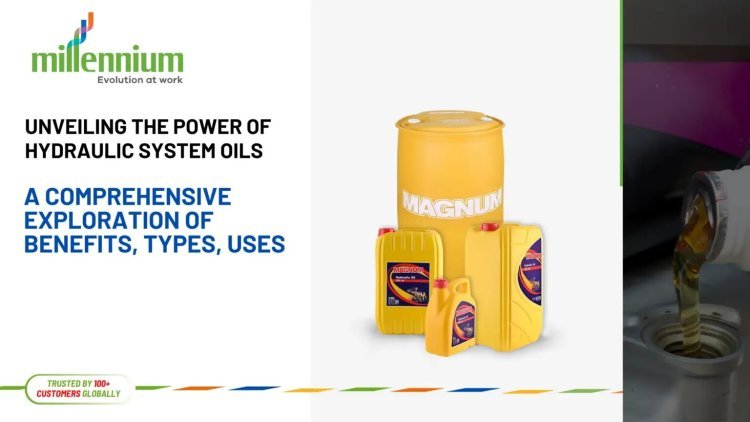Unveiling the Power of Hydraulic System Oils: A Comprehensive Exploration of Benefits, Types, Uses

Hydraulic systems are the backbone of numerous industrial and mobile machinery applications. At the heart of these systems is hydraulic oil, a specialized fluid that transmits power, lubricates components, and ensures efficient operation. This comprehensive exploration delves into what hydraulic oil is, the various types available, factors to consider when choosing the right oil, its uses, and the benefits it offers.
What is Hydraulic Oil?
Hydraulic oil is a fluid used in hydraulic systems to transfer power and energy. It serves multiple roles, including lubrication, heat transfer, and contamination removal, which are essential for the efficient functioning of hydraulic machinery. Typically, hydraulic oil is composed of a base oil and various additives that enhance its performance and longevity.
Types of Hydraulic System Oil
Hydraulic oils come in several types, each designed to meet specific requirements and applications:
- Mineral Oil: Derived from refined crude oil, mineral-based hydraulic oils are the most common. They offer good lubrication and are relatively inexpensive.
- Synthetic Oil: These oils are chemically engineered to provide superior performance, especially under extreme temperatures and pressures. They are more stable and have a longer lifespan than mineral oils.
- Water-Based Fluids: These include water-glycol and water-oil emulsions. They are used in applications where fire resistance is crucial, such as in steel mills and mining.
- Biodegradable Oil: Made from vegetable oils or synthetic esters, these environmentally friendly options are ideal for applications where oil spills might occur, reducing environmental impact.
Types of Hydraulic System Oil: How to Choose the Right One?
Selecting the right hydraulic oil is crucial for system efficiency and longevity. The choice depends on several factors:
- Viscosity: The oil's resistance to flow affects the system's performance. The right viscosity ensures optimal lubrication and power transfer.
- Temperature Range: Consider the operating temperature range. Synthetic oils often perform better under extreme temperatures.
- Additives: Additives enhance properties like anti-wear, corrosion resistance, and thermal stability. Choose oils with additives suited to your specific needs.
- Environmental Impact: For environmentally sensitive applications, biodegradable oils are preferable.
Factors to Consider when Choosing the Right Hydraulic Oil
When selecting hydraulic oil, consider the following factors to ensure optimal performance and longevity of your hydraulic system:
- Operating Environment: Temperature extremes, humidity, and exposure to contaminants influence oil selection.
- System Specifications: Manufacturer recommendations for oil type and viscosity are crucial to maintain warranty and performance.
- Load and Pressure: High load and pressure conditions require oils with excellent anti-wear properties.
- Compatibility: Ensure the oil is compatible with the system's seals and materials to prevent degradation and leaks.
Hydraulic Oil Uses
Hydraulic oil is indispensable in a wide array of applications:
- Industrial Machinery: Used in presses, lifts, and industrial robots, hydraulic oil ensures smooth operation and precision.
- Mobile Equipment: Essential for construction machinery, agricultural equipment, and forklifts, providing reliable power transfer and control.
- Automotive Systems: Found in power steering and braking systems, hydraulic oil contributes to vehicle safety and performance.
- Marine Applications: Used in deck machinery and steering gears, it ensures reliable operation in harsh maritime environments.
Benefits of Hydraulic Oil
Hydraulic oil offers numerous benefits that enhance the efficiency and reliability of hydraulic systems:
- Lubrication: Reduces friction and wear, extending the lifespan of components.
- Heat Dissipation: Helps manage system temperature by transferring heat away from critical areas.
- Power Transmission: Efficiently transmits power, enabling precise control and movement of machinery.
- Contamination Control: Carries away contaminants, protecting system components from damage.
- Corrosion Protection: Additives prevent rust and corrosion, ensuring long-term system integrity.
Conclusion: Types of Hydraulic System Oil Compared
Understanding the types of hydraulic system oil and their specific applications is crucial for maintaining the efficiency and longevity of hydraulic systems. Mineral oils offer a cost-effective solution for general purposes, while synthetic oils provide superior performance under extreme conditions. Water-based fluids are essential for fire-resistant applications, and biodegradable oils offer an environmentally friendly alternative. Choosing the right hydraulic oil involves considering viscosity, temperature range, additives, environmental impact, and system compatibility. By selecting the appropriate oil, you ensure optimal performance, reliability, and protection of your hydraulic systems, ultimately enhancing the efficiency and lifespan of your machinery.
What's Your Reaction?










![Wireless Connectivity Software Market Size, Share | Statistics [2032]](https://handyclassified.com/uploads/images/202404/image_100x75_661f3be896033.jpg)



